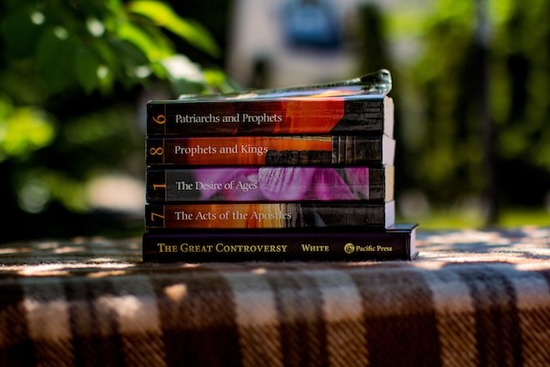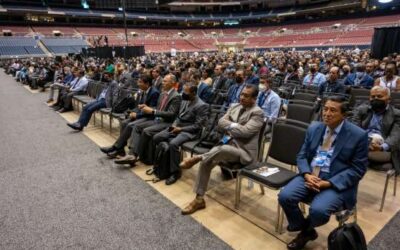Adventists have some unique beliefs—you might be able to name some of them right now.
The seventh-day Sabbath as a day of rest, remembrance, and worship.
Death as a “sleep” in the grave, instead of the soul consciously living on in heaven or hell.
Hell as nonexistence, instead of eternal torture.
So where did these beliefs come from? What Bible verses are they based on?
And, do Adventists use a different version of the Bible, or have their own version?
No, Adventists don’t have their own Bible. We use the same Bible translations that other Christian and Protestant denominations use.
But we understand your confusion, so let’s unpack the answer here. We’ll cover:
Why Adventists don’t have their own Bible

Photo by Wendy van Zyl
As Adventists, we don’t have our own Bible translation because we believe that the canon of the Bible as it exists today—both the Old Testament and the New Testament—is the reliable and unchanging Word of God. It was cherished, protected, and passed down to us through the ages, and we value it as the foundation of all our doctrines and teachings. Through it, God communicates with us by the Holy Spirit and points us to Jesus Christ.
We highlight this in our fundamental belief #1.
Here’s how the General Conference of Seventh-day Adventists puts it in an official statement1:
“The Holy Scriptures stand as the infallible revelation of God’s will, the norm for Christian values and life, the measure of all things within human experience, and the sole reliable guide to salvation in Christ.”
During the Reformation, Protestants called this philosophy sola scriptura—the Bible and the Bible alone. It means that the Bible is our ultimate authority and guide.
And, since Adventists indeed uphold the Bible in this way, we need to address some of the misconceptions that have cropped up about this.
Why do people think Adventists have their own Bible?
Even though Adventists don’t have their own Bible, people may think that for a few reasons:
- Our unique doctrines and beliefs
- Our use of Ellen G. White’s writings
- The Clear Word paraphrase
Our unique doctrines and beliefs
Adventists have many similar beliefs to other Christians—salvation by faith in Jesus; the Second Coming of Jesus at the end of the world; heaven, where Jesus will take His followers at the Second Coming; and more.
But some of our beliefs are unique, such as the seventh day as the Sabbath; death as a sleep in the grave until Jesus returns; and Jesus’ work in the heavenly sanctuary. These beliefs involve a different interpretation of certain Scriptures than you might have heard before.
But these Adventist beliefs come from the same Bibles most Christians are already familiar with, such as the King James Version, English Standard Version, or the New International Version, to name a few.
Our use of Ellen G. White’s writings

Photo by Emmanuel Phaeton on Unsplash
Adventists accept the writings and teachings of Ellen G. White as a product of the biblical gift of prophecy (Romans 12:6; 1 Corinthians 12:28). As a result, people wonder if we treat her writings as Scripture.
We don’t. The Bible instructs us to “test everything [and] hold fast what is good” (1 Thessalonians 5:21, NKJV). This means checking whether what we’re reading or learning aligns with the Bible. In this way, we test Ellen White’s writings—just like we would any other books or materials. And that alone shows that her prophetic writings are not the authoritative standard. Rather, her books were written to encourage further Bible study and assist fellow Christians in applying Scripture to daily life.
The Clear Word paraphrase
In 1994, Jack Blanco—a theology professor at Southern Adventist University—published a paraphrase of the Bible called The Clear Word, basing it on thoughts he wrote during his own personal Bible study. This book’s fast-growing popularity caused it to be misrepresented as a Bible, leading people to think that it was an Adventist translation, similar to the Book of Mormon or the Jehovah’s Witnesses’ New World Translation.
But a quick look at the book’s preface of the 2004 edition says otherwise:
“The Clear Word is not a translation, but a devotional paraphrase of Scripture expanded for clarity…. It should not be considered a study Bible. Excellent translations of the Scriptures are available for such purposes.”
It is a devotional tool with an Adventist interpretation of Bible texts—but it was never meant to be used as the primary source for Bible study or worship services. Jack Blanco himself never wanted people to take it as such.
And the Seventh-day Adventist Church has never claimed it is a Bible, as stated by Dr. Jud Lake, an Adventist theologian who wrote a paper about The Clear Word.
When this book was first published, it became popular with those wanting help and encouragement while studying trickier parts of Scripture. Due to this, it became a frequent resource at small group Bible studies and more. But regardless of how this devotional book was originally described or circulated among individual Adventists or local congregations, Dr. Lake clarified,
“. . .The Clear Word is not a translation, nor is it a study Bible. . . . This devotional paraphrase, therefore, is intended for private devotional reading only. It is not for serious study, teaching, preaching, or public reading of Scripture.”2
This paraphrase was the thoughts of one man, commenting on the Bible. It can never be equal to a Bible.
What are different Bible translations, and what do Adventists use?
All Bible translations that exist today can fit into three different categories: literal, dynamic equivalents, and paraphrases. These translations are all based off of the original Greek and Hebrew texts copied and passed down through the centuries.
The official Adventist Church doesn’t officially have a preferred translation, and its members use and own a variety. It’s common for people to own multiple versions for study purposes. Let’s learn more about them.
Literal translations

Photo by Tim Wildsmith on Unsplash
Literal translations of the Bible aim to translate the Hebrew and Greek texts as directly as possible. For this reason, they are sometimes called word-for-word translations.
Examples of literal translations are:
- The King James Version (KJV)
- The New King James Version (NKJV)
- Young’s Literal Translation (YLT)
Many people, Adventists included, prefer literal translations for in-depth Bible study because they tend to be closest to the original text.
Dynamic equivalents
Dynamic equivalents, also known as thought-for-thought or meaning-to-meaning translations, are all about conveying the message of the text, rather than the exact words. Sometimes the same words can have different connotations in different languages, cultures, or periods of history. So the translators of these versions made sure to consider the historical and cultural background of the text so it could best be expressed in modern terms, while preserving the intent of the Bible writers.
Dynamic equivalents include:
- The New International Version (NIV)
- The Good News Translation (GNT)
- The New Living Translation (NLT)
- The Revised English Bible (REB)
- The Contemporary English Version (CEV)
Paraphrases
Paraphrases focus on interpreting the Bible text rather than merely expressing what it says. Thus, they don’t fit the definition of a Bible translation and should be used as study aids, not Bibles.
Some paraphrases are:
- The Living Bible
- The Message
- The Clear Word
And if a paraphrase seems to assert a different idea than you find in a Bible translation, it’s wise to consider the Bible as the standard, not the paraphrase. Some who own paraphrases of the Bible have many different ones, so they can also compare between them as well.
To give you an idea how different translations affect the text, here’s a comparison of 1 Corinthians 13:4 between literal, dynamic, and paraphrases.
| Literal (New King James Version) | Dynamic (New International Version) | Paraphrase (The Message) |
| “Love suffers long and is kind; love does not envy; love does not parade itself, is not puffed up.”3 | “Love is patient, love is kind. It does not envy, it does not boast, it is not proud.”4 | “Love never gives up. Love cares more for others than for self. Love doesn’t want what it doesn’t have. Love doesn’t strut, Doesn’t have a swelled head.”5 |
What about the Seventh-day Adventist Bible Commentary?
The Seventh-day Adventist Bible Commentary is just that—a commentary. It’s not a Bible and doesn’t claim to be. Instead, it’s a verse-by-verse analysis of the Bible, put together by theologians to help Adventists in their study.
Adventists use the SDA Bible Commentary in the same way that other Christians might use well-known commentaries like Matthew Henry’s Commentary or The MacArthur Bible Commentary.
Again, the Bible must be our standard to test the teachings of the commentary—not the other way around.
Adventists cherish the same Bible other Christians do
The Advent Movement, which eventually became the Adventist Church, began with people from various Christian denominations—Baptist, Congregationalist, Methodist, etc. When these individuals started Seventh-day Adventism, it was because they felt that it was necessary for Christians to continue studying the Bible to discover new things and new applications of its timeless truths.
That remains our priority to this day. The Bible alone is the foundation of our faith, and there’s always more we can learn from it. And it’s an essential part of getting to know Jesus more deeply.
Find a Church
If you’re interested in finding a local Adventist church near you, you can use the Adventist Locator provided by the General Conference of Seventh-day Adventists.
[1] “The Holy Scriptures,” General Conference of Seventh-day Adventists, https://www.adventist.org/official-statements/the-holy-scriptures/. [↵]
[2] Lake, Jud, “The Seventh-day Adventist Church and The Clear Word,” http://www.ellenwhiteanswers.org/media/pdf/Clear-Word-Ratz.pdf. [↵]
[3] “1 Corinthians 13:4,” Bible Gateway, https://www.biblegateway.com/passage/?search=1+corinthians+13%3A4&version=NKJV. [↵]
[4] “1 Corinthians 13:4,” Bible Gateway, https://www.biblegateway.com/passage/?search=1+corinthians+13%3A4&version=NIV. [↵]
[5] “1 Corinthians 13:4-7,” Bible Gateway, https://www.biblegateway.com/passage/?search=1+corinthians+13%3A4&version=MSG.[ ↵]
More Answers
What’s Vacation Bible School? (And Should I Enroll My Kids?)
Vacation Bible School (VBS) is a weekday summer program organized by churches to help kids make friends in a positive environment, participate in constructive activities, and learn more about Jesus and the Bible.
What is the Role of Laypeople vs. the Role of Clergy?
The word “laity” comes from the Greek word laikos, which means “of the people.”
Do Seventh-Day Adventists Have “Rules” For Clothing?
Many religions have guidelines on dress, but what about the Adventist Church? Discover how Adventists choose to dress based on biblical principles.
11 Reasons People Become Seventh-day Adventists
Curious why many people become Adventists? Here are elements of Adventist beliefs, values, and mission often reflected in people’s decisions to join.
What’s the Seventh-day Adventist General Conference Session?
At the General Conference Session, Adventist delegates from around the world gather to assess the state of the organization, pray, and discuss current issues. Here’s how it works.
How Adventists View the End of the World
The end of the world is no fun to think about. But here’s how we can actually find hope and comfort in what’s to come.
What Is an Adventist Medical Missionary?
A medical missionary in the Adventist Church is someone who cares for the medical needs of people as a way of showing the love of Jesus. They may travel to another country, or even just serve in their hometown.
Is the Seventh-day Adventist Church Protestant?
With so many Christian denominations, it can be hard to keep track of which ones share which beliefs. Let’s look at the core Protestant beliefs of Adventism.
Are Seventh-day Adventists Evangelicals?
According to its origins and definition, evangelicalism is about following Jesus and the Bible and sharing the Gospel through the way we live our lives. Adventists wholeheartedly harmonize with these principles.
Could Anything Keep Me from Becoming an Adventist?
We are each saved through Christ. But when it comes to church membership, are there certain beliefs or expectations to become an Adventist?
Do Seventh-day Adventists Have “Rules”?
We uphold principles we believe will help us maintain a closer relationship with Jesus and His Word. Learn how these principles guide Adventist lifestyles.
Do Seventh-day Adventists Have “Rules” For Marriage?
Around the world, many cultures and religions have various marriage traditions, expectations, or even rules when it comes to choosing a partner, planning the wedding, extended family logistics, or a number of other things.
Can a Seventh-day Adventist Marry a Non-Adventist?
Yes. Seventh-day Adventists are not under any official rules that dictate who they can or cannot marry. This is a personal, life-altering decision between the couple and God.
What Adventists Believe About Alcohol and Tobacco Use
The Seventh-day Adventist Church has historically discouraged the use of alcohol and tobacco. Even before the church started in 1863, its leaders were realizing the negative effects of these substances.
Is the Soul Immortal? Exploring What Adventists Believe
Based on the way the Bible describes humanity in comparison to God and angels, Seventh-day Adventists believe souls are not something you have, but something you are.
Jewelry—Why Do Many Seventh-day Adventists Choose Not to Wear It?
If you walk into a Seventh-day Adventist church service, you might notice that many people aren’t wearing earrings, bracelets, necklaces, or sometimes even wedding rings.
International Pathfinder Camporee
Youth aged 10-15 in the Adventist Church’s global Pathfinder program look forward to the International Camporee every 5 years. This event brings together Pathfinders from around the world for exciting activities.
How Adventists interpret Bible prophecy
Bible prophecy conjures up a variety of emotions in people. For some, it feels exciting or mysterious.
Moviegoers’ Guide to The Hopeful: The Facts Behind the Film
Learn where and when you can watch The Hopeful and how to get tickets. Already seen it? We’ll uncover the real story that inspired this film.
How Are Seventh-day Adventists Different from Other Protestants?
As a Protestant Christian denomination, the Seventh-day Adventist Church regards the Bible as the ultimate guide and looks to Jesus Christ as the only way to salvation. We do have some differences of belief or interpretation when it comes to topics like Bible prophecy, end-time events, the Sabbath, and a person’s state after death.
How Adventists Handle Death and Funerals
Most Seventh-day Adventist funeral services are similar to those of other Protestant denominations, such as Methodists, Baptists, or Presbyterians, but you might find a few differences or unique nuances.
Adventist Culture
Many Seventh-day Adventists adhere to specific lifestyle principles that can make them stand out from those in other Christian denominations. Whether it’s going to church services on Saturday or eating the popular Adventist entrée of “haystacks.”
Do Seventh-day Adventists Believe Only They Will Go to Heaven?
No, Adventists definitely don’t believe they’re the only ones that will go to heaven. As a matter of fact, we don’t believe admittance into heaven is ever based on which church or denomination we belong to. People all over the world from different Christian denominations, religions, and walks of life will be welcomed by Jesus.
Do Adventists Observe Easter-Related Holidays?
Jesus Christ’s resurrection, celebrated on many Easter-related holidays, is central to the beliefs of the Seventh-day Adventist Church. And that means we seek every opportunity to remember it.
An Overview of Seventh-day Adventist Higher Education
The Seventh-day Adventist Church has about 118 tertiary schools around the world. Though many of them are within North America, you’ll also find Adventist universities in countries across the world—places like Croatia, Austria, Brazil, Madagascar, and the Philippines.
The Ten Commandments from a Seventh-day Adventist Perspective
Ever eaten a salad and gotten a big piece of green stuck in your teeth? And you didn’t realize it was there until you looked in the mirror? (Because no one ever told you!)
The Benefits of A Seventh-day Adventist Academy
Adventist academies are high schools (grades 9-12) that are owned and operated by the Seventh-day Adventist Church.
Are Seventh-day Adventists Christians?
Yes, the Seventh-day Adventist Church is a Protestant Christian denomination formed in 1863. Just like other Christians, we believe that Jesus Christ is our Savior and seek to follow the principles of the Word of God.
Adventist Movies: Where Faith and Film Meet
The Adventist Church uses film to share our faith and uplift positive values. Learn more about specific Adventist-produced films and where to find them.
Didn’t find your answer? Ask us!
We understand your concern of having questions but not knowing who to ask—we’ve felt it ourselves. When you’re ready to learn more about Adventists, send us a question! We know a thing or two about Adventists.





























